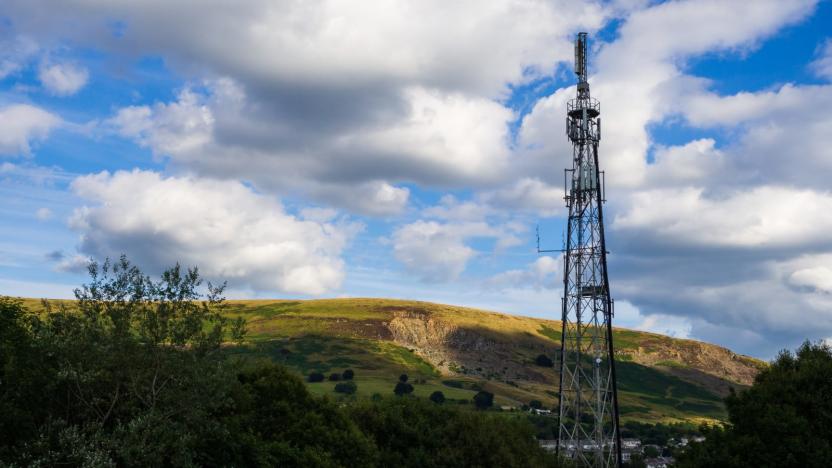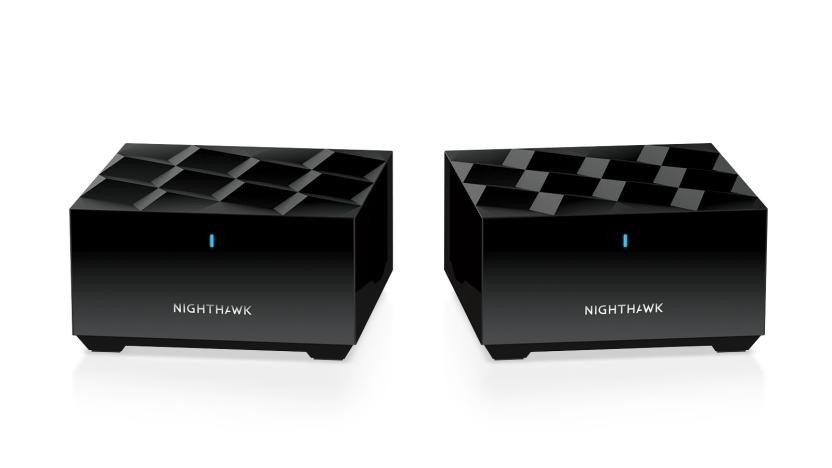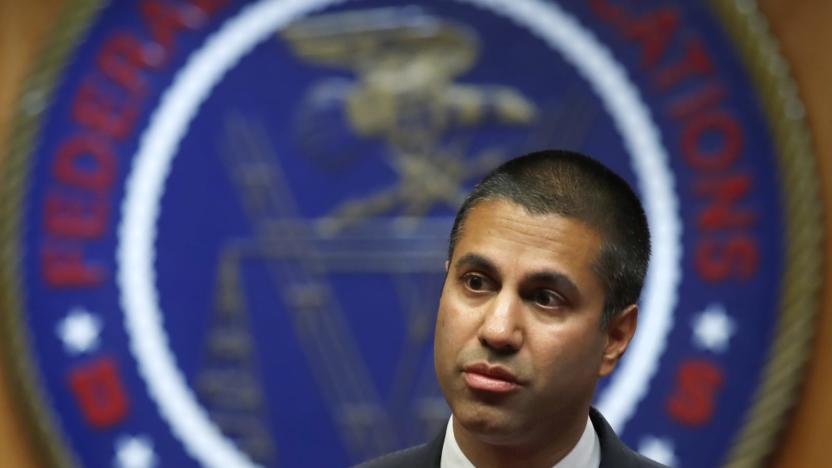high-speed internet
Latest

Alphabet's Project Taara is beaming high-speed internet across the Congo River
Alphabet's Project Taara moonshot successfully established high-speed internet in the Congo.

Facebook's gigabit wireless rolls out in Puerto Rico
Facebook's Terragraph WiFi technology is delivering high-speed broadband to San Juan, Puerto Rico. This week, AeroNet, Puerto Rico's internet service provider, announced a six-month Terragraph pilot meant to deliver reliable, affordable high-speed service. It's now live in and near Plaza de Armas and Plaza San Jose in Old San Juan.

FCC commits $20.4 billion to help close the rural digital divide
Over the next 10 years, the Federal Communications Commission (FCC) will spend $20.4 billion to bring high-speed broadband internet to underserved rural America. "This is the biggest step we've taken to close the digital divide," FCC Chairman Ajit Pai said in a video today.

Netgear's Nighthawk WiFi 6 mesh routers aren't crazy expensive
When Netgear introduced its Orbi WiFi 6 mesh router last fall, one of the things that stood out the most was its $700 price tag. Now, Netgear is ready to unveil a more affordable option. At CES this week, it introduced the Nighthawk Mesh WiFi 6 System, a router and satellite kit that will start at $229.99.

Google Fiber will bring wireless gigabit internet to Austin
Austin apartment dwellers will soon get another option for high-speed internet. Google Fiber announced that it is rolling out Webpass to the Texas city, making it the eighth metro area to offer the service. The point-to-point wireless offering is aimed at high-occupancy residential and commercial buildings, and works by transmitting gigabit internet via rooftop antennas. Austin, which has had access to Google Fiber since 2014, will be the first city to host both high-speed internet options.

FCC claims rural broadband access is improving
In a draft of its annual Broadband Deployment report, the Federal Communications Commission says the so-called digital divide is narrowing. Millions more Americans have access to modern broadband connectivity, particularly in rural regions. As such, the report suggests broadband "is being deployed on a reasonable and timely basis."

Comcast's new broadband service is twice as fast as Google Fiber
Comcast has drawn a new battle line against Google Fiber by launching a 2Gbps fiber broadband service called Gigabit Pro. It arrives next month in Atlanta and will be available in 18 million homes across the US by the end of the year. The package will deliver symmetric uploads and downloads like Fiber does, but at twice its 1Gbps speed. Mountain View had already announced that it would bring Fiber to Atlanta, but Comcast will now beat it to the punch both in timing and data rates.

New York governor wants statewide 100Mbps internet by 2019
With a $1 billion plan, New York Governor Andrew Cuomo hopes to have every New Yorker hooked up to high-speed internet by 2019. The administration is billing it as the largest state investment in universal broadband in the country. Just how fast are we talking, here? In most cases, the program calls for providers to offer at least 100 Mbps, or as Chief Digital Officer Rachel Haot described it at a press conference, "more than 10 times the federal definition of 'broadband.'"

NBN bringing 1Gbps network to Aussies by the end of 2013
Don't want to trek it to Provo, Utah -- or Austin or Kansas City -- to get 1Gbps internet courtesy of Google Fiber? By the end of this year, you can venture Down Under to get comparable speeds courtesy of Australia's National Broadband Network (NBN). The wholesale price for the network's 1Gbps service will be AU$150 (about $155) per month, with an additional fee to be tacked on by ISPs. NBN will also roll out 250Mbps and 500Mbps services by December, naturally for a lower monthly cost. Sure, 1Gbps speeds may not be necessary for the average household, but leave it to Japan to make those numbers look positively puny with its recently launched service offering 2 Gbps down. Planning that next vacation around internet speeds might just be the way to go.

Croatian Telecom piloting 1Gbps TeraStream network with Cisco behind the wheel
Chattanooga has it, and soon Zagreb may have it too: Yesterday, Hravatski Telecom, the Croatian unit of Deutsche Telekom, demoed its TeraStream network capable of 1Gbps, with a 400Gbps network capacity. Cisco is supplying the network solution, which is based on the IPv6 protocol and provides voice, IPTV and Internet access. As is so often the case with new blazing networks, TeraStream is still in the pilot phase, with user-experience testing in the country's capital carrying into 2013. Those of you who speak Croatian can skip past the break for an explanatory video from HV.

Dish Network's nationwide satellite broadband service could be ready to launch soon
While the various strands of Dish Network's "Seinfeld strategy" have yet to come together officially, Bloomberg and the Wall Street Journal are reporting it could be ready launch satellite-based high speed data services nationally as soon as September or October. This would be separate from the service based on ViaSat's Exede that's available in some areas, and Bloomberg's sources say it could accommodate up to 2 million customers right away through a satellite Echostar launched in June, although more satellites may be needed to add more customers. Other than hooking up data connections for customers in rural areas, it would let Dish compete directly with data / TV bundles offered by wired pay-TV providers. Of course, this is all dependent on a favorable ruling by the FCC on its technology -- you can just ask LightSquared what happens if that doesn't work out.

Comcast doubles broadband speeds 'in certain markets,' launches 305Mbps Xfinity Platinum service
Comcast has just done the deed -- following a rumor on the matter, it's launching 305Mbps (down) / 65Mbps (up) Xfinity Platinum internet service in the highly populated Northeast division of the United States. For those who've been around a while, you may remember a time where one would weep upon finding out that Verizon's FiOS simply wasn't available at a desired location. Now, however, Comcast is doing its darnedest to rival fiber-to-the-home options with blisteringly fast cable service. In addition to its new flagship tier, the provider is also doubling the speeds of two of its existing internet speed tiers in certain markets at no additional cost. Specifically, Xfinity Blast! customers will now get download speeds of up to 50Mbps (formerly 25 Mbps), and Extreme 50 customers will now receive speeds of up to 105Mbps (formerly 50 Mbps). According to GigaOM, the ultra-desirable Platinum service will ring up at $300 per month, which is a full $90 more than Verizon's own 300Mbps FiOS option. Of course, this probably means that you'll hit your monthly cap a heck of a lot faster, but hey -- at least you'll get bragging rights.

Google Fiber is coming on July 26, Kansas readies to open its pipes
We're always being told we need more fiber in our lives. For most people, that might constitute a second bowl of cereal in the morning -- for the lucky Google Fiber-receiving residents of Kansas City (or Kansas City) however, it means big spoonfuls of super fast internet. While the project has been in the virtual pipes for a while, finally it looks like we're ready for the next step. July 26th, Google advises, is the date for diary. Better pencil that one in, and consider any last-minute hardware upgrades.

The most expensive internet in America: fighting to bring affordable broadband to American Samoa
"You could argue that there's some value in it." That's New York City Mayor Michael Bloomberg, speaking candidly during a recent interview at D10 in California. The topic of conversation? Widespread WiFi, and whether or not the government should be the one thinking about its future ubiquity. More specifically, if WiFi hotspots should be treated like "roads or water supply," as aptly stated by AllThingsD's Kara Swisher. This obviously isn't the first time such an idea has crossed the minds of those connected to Washington, D.C. Muni-Fi (municipal wireless networks) projects were all the rage a few years back, but one spectacular failure after another swiftly extinguished that momentum. In more modern times, America (as well as other nations) has sought to solve the "rural broadband" problem, bringing high(er)-speed internet connections to places with a higher bovine population than human. But bringing broadband to places like rural North Dakota seems like an easy chore to a small, but passionate, group of 60,000 sitting some 4,770 miles from San Diego, California. American Samoa may be an unincorporated US territory located closer to pure bliss than the hustle and bustle of Wall Street, but it's no doubt being taken into consideration in recent mapping projects aiming to pinpoint the areas most lacking in terms of digital infrastructure. Unbeknownst to most mainlanders, this fragile island chain is home to the most expensive internet in America, and the political issues surrounding it are astonishing. Head on past the break to learn more on what I discovered.

ZTE blasts past the speed barrier with field test of 1.7Tbps data transmission
That bank-breaking 150/35Mbps FiOS connection you're so proud to call your own? Yeah, it looks like dial-up next to the searing terabit speeds recently achieved by ZTE's optical network. The Chinese telco, mostly known stateside for its mobile handsets, has successfully completed an experiment designed to highlight the possibility of migrating "from a 100G transmission system to a 200G system." In layman's terms, that's a data punch of 200Gbps-plus sent over eight channels, which in this case, totals about 1.7Tbps. Impressed? You should be, but don't cast your home connection the side-eye just yet. Like Deutsche Telekom's comparatively lesser feat, you'll likely amass a few wrinkles and lbs before this tech becomes consumer-ready. Check out the official PR after the break.

Alcatel-Lucent plants two flags in Latin American soil: LTE and 100Gb/s cable
Not content with newly arrived iTunes and Netflix, Latin America's growing population of web aficionados are seeing some major investment in high-speed internet services too. Alcatel-Lucent says it's won contracts to provide infrastructure for the region's first LTE network -- in Uruguay, to be precise -- as well as the first 100Gb/s optical cable network, which will soon be streaming telenovelas across Argentina. Welcome to the revolution, compañeros, and read on for the full PR.

NC governor will let cable-backed bill restricting municipal broadband become law
We've repeatedly hammered Time Warner Cable (and its big-cable cronies) for crying to the North Carolina legislature about municipal broadband. TWC claims it can't compete with taxpayer-backed ISPs such as Wilson, NC's Greenlight -- and that it shouldn't have to. In fact, Greenlight and four other municipal providers came about specifically because corporate players refused to provide inexpensive, fast broadband. And now that local governments have proven they can provide it, the cable companies have cried foul, pouring hundreds of thousands of dollars into select political pockets all the while. That's the drama so far, and now a bill restricting municipal broadband -- mandating that providers pay taxes similar to private companies, for example -- has landed on the desk of Governor Bev Perdue. She won't veto the bill, meaning it will soon become a law; for whatever it's worth (read: not much), she also refuses to sign it. The reason? Here it is from the horse's mouth: I will neither sign nor veto this bill. Instead, I call on the General Assembly to revisit this issue and adopt rules that not only promote fairness but also allow for the greatest number of high quality and affordable broadband options for consumers. The legislation strikes a blow against public ISPs in a country that ranks ninth in the world for broadband adoption and download speeds. And that, apparently, is what "fair competition" looks like in the US. [Image courtesy of IndyWeek]

WiMAX sleeve brings 4G speeds to the iPhone 4 in South Korea
This is exactly how we humans got out of the trees five million years ago. We spot a problem, like the iPhone 4's lack of 4G data, and we solve it. In fact, Korean Telecom's new Egg sleeve not only brings WiMAX to the iPhone 4 but also incorporates an extra battery to allow five hours of 4G surfing. It could make bipedalism slightly uncomfortable however, by bulking your pocket out with 2.4 ounces (68g) in added weight plus a third of an inch (8mm) in extra thickness. Primates outside of South Korea can't buy the ₩129,800 ($120) Egg right now, but problem-solving minds can always use 4G mobile hotspots instead -- like the Sprint Overdrive or Verizon's new LTE-based MiFi. That's why we're the jungle VIP.

Big cable-backed broadband bill soars through NC House, one step closer to stifling ISP competition
We've said it before, and we'll say it again: Time Warner Cable is made up of some insanely shady folks. And frankly, it's not just TWC to blame here -- CenturyLink, Embarq and a smattering of other big telecom companies are banding together in order to push the ironically-named H129 "Level Playing Field" bill straight into law. Unfortunately, said bill sailed through the clearly oblivious (or "persuaded") North Carolina House this week, with just 37 sane individuals voting against 81 delusional proponents. For those outside of the loop, the bill effectively suggests that commercial entities -- municipal ISPs like Wilson's own Greenlight that provide greater levels of service with lower costs -- are unfairly competing against for-profit monoliths. In short, that's an absolute joke. Rep. Bill Faison nailed it with this quote: "This bill will make it practically impossible for cities to provide a fundamental service. Where's the bill to govern Time Warner? Let's be clear about whose bill this is. This is Time Warner's bill. You need to know who you're doing this for." Yours truly just so happens to reside in the wonderful state of North Carolina, and knows first-hand what it's like to live in a major metropolitan area with a single high-speed broadband carrier. TWC has only recently announced impending DOCSIS 3.0 coverage, but early installations in the heart of Raleigh have been fraught with latency issues and router difficulties. Oh, and it's charging $99 per month for a service with 5Mbps up; for comparison's sake, Greenlight gives customers 10Mbps internet (in both directions), home phone and expanded basic cable for the exact same fare. So, NC lawmakers -- how exactly do your constituents gain access to that "level playing field?" [Image courtesy of IndyWeek]

FCC report finds 68 percent of US broadband connections aren't really broadband
As the FCC itself has made abundantly clear, the definition of "broadband" is an ever-changing one, and its latest report has now revealed just how hard it is for the US to keep up with those changes. According to the report, a full 68 percent of "broadband" connections in the US can't really be considered broadband, as they fall below the agency's most recent minimum requirement of 4 Mbps downstream and 1 Mbps upstream. Also notable, but somewhat buried in the report, are the FCC's findings on mobile broadband use. The agency found that mobile wireless service subscribers with mobile devices and "data plans for full internet access" grew a hefty 48% to 52 million in the second half of 2009, and that when you consider all connections over 200 kbps, mobile wireless is actually the leading technology at 39.4 percent, ahead of cable modems and ADSL at 32.4 and 23.3 percent, respectively. When it comes to connections over 3 Mbps, however, cable modems account for a huge 70 percent share. Looking for even more numbers? Hit up the link below for the complete report.













